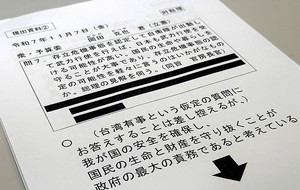By KAZUAKI KANDA/ Area Reporter
January 3, 2025 at 07:00 JST
AMAMI, Kagoshima Prefecture--Warmer ocean temperatures are blamed for a major bleaching event this summer that killed 61.2 percent of corals off Amami-Oshima island.
The damage was found in a survey conducted by the Amami Marine Life Research Association.
It is on par in scale with the 1998 mass bleaching that saw a large portion of corals in the area bleached to death, the association said.
The latest bleaching was apparently brought on by average ocean temperatures rising by up to 2 degrees higher during the summer than in 2023, it added.
Members of the research association, which is chaired by Katsuki Oki, conducted surveys in 63 points in the sea area surrounding Amami-Oshima to determine the status of the bleaching event that occurred in August.
They snorkeled in the area between October and November to visually check on the mortality rate of corals on the seafloor.
They confirmed that corals were killed by bleaching at all the survey points.
The mortality rate was higher in bays and reefs, including Kasari Bay in Amami and Ongachi Bay in Yamato.
Meanwhile, the bleaching event had little effect in the Oshima Straits in Setouchi and outside reefs.
Many colonies of table-shaped corals or branch-shaped Acropora corals were found to have perished.
The bleaching was likely caused by high ocean temperatures.
The average temperature was 30.2 degrees in July and 30.4 degrees in August.
In particular, the August temperature was 2.1 degrees higher than in the same period in 2023.
Thanks to a reduced number of typhoons approaching Japan, ocean temperatures remained high.
In Amami, many corals perished due to the major bleaching event in 1998.
They also suffered from the devastation wrought by the outbreak of the crown-of-thorns starfish, which prey on corals.
Although bleaching has occurred once every several years since then, corals were recovering.
"I was shocked because the corals had been recovering since 1998," Oki said. "But because corals growing in deeper waters have had little impact and because there are no signs of an outbreak of crown-of-thorns starfish, I expect that the corals will recover quickly."




















A peek through the music industry’s curtain at the producers who harnessed social media to help their idols go global.
A series based on diplomatic documents declassified by Japan’s Foreign Ministry
Here is a collection of first-hand accounts by “hibakusha” atomic bomb survivors.
Cooking experts, chefs and others involved in the field of food introduce their special recipes intertwined with their paths in life.
A series about Japanese-Americans and their memories of World War II